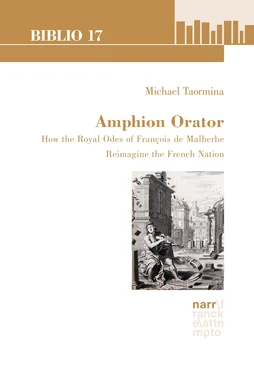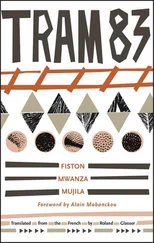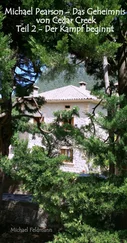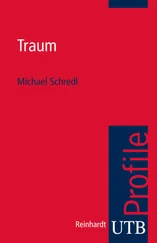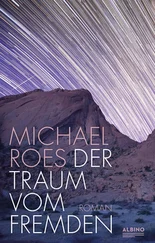In the limited sense of the term “consent,” moreover, Malherbe’s praise for superlative, quasi-divine, and heroic magnanimitymagnanimity seeks recognition from the universal audienceuniversal audience of great soulmagnanimitygreat souls, in this instance, the civic community or body politicbody politic of the nationnation. As Mark Bannister notes, the heroic class myth of the sword nobilitynobilityof the sword portrayed the nobles as “the defense and bulwark of the state” (Bannister, Privileged Mortals 26). In the royal odes, the Bourbons take over this role. The nationnation’s other great soulmagnanimitygreat souls are invited to recognize the preeminence of their monarch, to follow his (or her) exampleexample, and to win glory pro rege et patria pro rege et patria. By means of this patriotic ethospatriotismpatriotic ethos, based on the virtuevirtue of magnanimitymagnanimity, the royal odes merge the class myth of the sword nobilitynobilityof the sword with the nationnational myth of the sequence. In the overarching conceitconceit of the sequence (where the ship of stateship of state navigates the troubled waters of political discord and conducts the nationnation to a new Golden AgeGolden Age), the Bourbons play the role of captain and/or pilot, while the other great soulmagnanimitygreat souls of the civic community play the role of supporting heroes and crew. Though not entirely apparent at the beginning of the sequence, the myth of the ArgoArgo becomes the primary intertext supporting Malherbe’s poetic sequence.
Thus the conception of virtuevirtue informing Malherbe’s royal odes—magnanimitymagnanimity that is superlative, quasi-divine, and heroic—stands on one side of an ideological fault line. The fact that ideas of virtuevirtue similar to Malherbe’s were finding vigorous expression in novels and theater of the 1630s and 40s suggests that such aspirations had already begun to migrate from the realm of political reality to the symbolic world of nostalgic reminiscence. The heyday of the heroic novel and theatre was an expression of the nobilitynobility’s ideological consciousness, allowing members of the caste to continue to define themselves in traditional ways while adapting to the social and economic realities encroaching on the caste as a whole. Lyriclyric poetry poetry, which by the third decade was for the most part composed in the salonsalons milieu, traveled a separate path, eschewing the heroic in favor of the honnête honnête hommehonnêteté [honorable] and the galant [flirtatious]. The ideological ground shifted right under Malherbe’s feet, so rapidly and significantly did the definition of nobilitynobilitydefinition and the caste’s relationship to the monarchy evolve in the first three decades of the seventeenth century.
Конец ознакомительного фрагмента.
Текст предоставлен ООО «ЛитРес».
Прочитайте эту книгу целиком, купив полную легальную версию на ЛитРес.
Безопасно оплатить книгу можно банковской картой Visa, MasterCard, Maestro, со счета мобильного телефона, с платежного терминала, в салоне МТС или Связной, через PayPal, WebMoney, Яндекс.Деньги, QIWI Кошелек, бонусными картами или другим удобным Вам способом.
